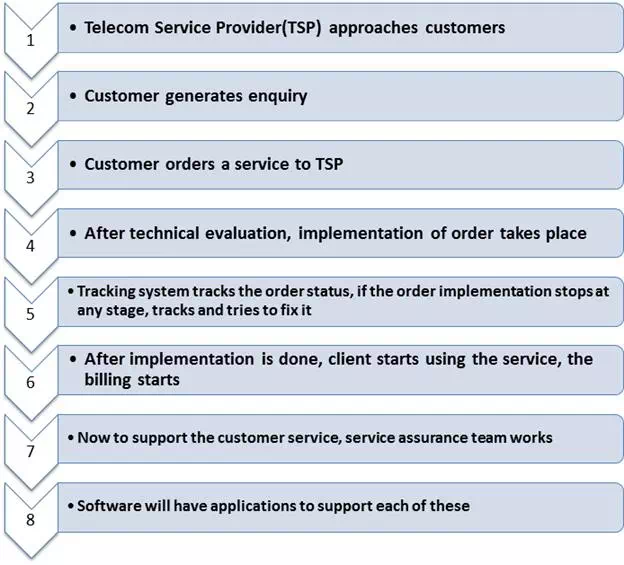Testing Telecom Domain Application with Sample Testcases
Since the shift of telecom sector to computer network and digital medium, telecommunication sector has undergone a major software transformation. Telecom started depending on the various types of software components to deliver many services like routing and switching, VoIP broadband access, etc. Hence, that telecom testing has become an inevitable process.
In this tutorial, we will learn-
● What is Domain in Testing?
● Why Domain Knowledge Matters?
● Business Processes in Telecom Industry
● Typical Telecom Business Process
● Types of Protocols used in Telecom Industry
● Testing LifeCycle in the Telecom Industry
● Types of Testing Performed on Telecom Software
● Sample TestCases for Telecom Testing
What is Domain in Testing?
Domain is nothing but the industry for which the software testing project is created. When we talk about software project or development, this term is often referred. For example, Insurance domain, Banking domain, Retail Domain, Telecom Domain, etc.

Usually while developing any specific domain project, domain expert help is sought out. Domain expert are master of the subject and he may know the inside-out of the product or application.
Why Testing Domain Knowledge Matters?
Domain knowledge is quintessential for testing any software product, and it has its own benefits like

Business Processes in Telecom Industry
For telecom testing end-to-end service verification is important. To ensure efficient testing a good understanding of different Business process is a must.
You need to understand each stage of service deliverability before drafting the test cases.
Telecom services are either based on a business support system that includes IVR's, Call Centers, generating invoices, etc. or an operation support system that includes routers, switches, cell towers, etc.
The following table shows what activities are performed at different levels
|
Telecom Department |
Telecom Activities |
|
Pre-sales |
● It handles all the sales information like discounts, services, promos, etc. |
|
Ordering |
● Applying for a new connection or disconnecting a connection |
|
Provisioning |
● This division deals with the physical connection between customers and TSP ( Telecom Service Provider) |
|
Billing |
● Under this division, all billing work is done |
|
Service Assurance |
● In case of any failure, this division corrects the problem |
|
Inventory Systems |
● It is the repository of all information |
|
Tracking |
● This division tracks the ordering system and the status of an order |
Typical Telecom Business Process
Following is a typical business process in the Telecom Industry.

Types of Protocols used in Telecom Industry
Here the popular protocols used in the Telecom industry
● VoIP technologies: VoIP, IMS, MPLS, ISDN, PSTN
● Signaling and Protocols: SIP, ISDN, Codecs, H.323
● Wireless technologies: GPRS, CDMA, GSM, UMTS
● Network Management: SNMP
● Layer 2 Protocols: ARP, STP, L2TP, PPP
● Layer 3 protocols/routing: ICMP, BGP, ISIS, MPLS
● Infrastructure/Security: ATM, TCP/IP, LAN/VLAN, SSH
You can learn more about Protocol Testing here
Testing LifeCycle in the Telecom Industry
The Test Lifecycle in the telecom industry is similar to that of any other industry but with a stress on details. Here is how the test lifecycle looks like along with the test artifacts.
|
Telecom Testing Stage |
Test artifacts |
|
● Business View |
● Requirement based test artifacts ● Feasibility based artifacts ● Standard and policy identification based test artifacts ● Operation and maintenance considerations related test artifacts |
|
● System/ Architecture |
● System test artifacts (Security, Installation) ● Test artifacts for virtual prototype ● Special System Testing artifacts ( interoperability, disaster recovery) |
|
● Implementation |
● Unit test artifacts ● Integration test artifacts ● Quality and performance artifacts ● Regression, load testing, sanity, etc. |
|
● Deployment |
● Acceptance test artifacts ● Integration test artifacts ● Quality and performance artifacts ● Functional test artifacts ● Alpha/Beta test artifacts |
Types of Testing Performed on Telecom Software
● Interconnection Testing
● Conformance Testing
● IVR Testing
● Performance Testing
● Security Testing
● Interoperability Testing
● Protocol Testing
● Functional Testing
● Automation Testing
Sample TestCases for Telecom Testing
In Telecom Testing, one must consider testing following
|
Various Telecom Testing |
Testing activities in Telecom |
|
Billing System |
● Verify, the telephone number of the customer, is registered under telecom operator ● Verify whether number is still working ● Verify the number entered is valid, and it is 10 digit number ● Verify the number is not blocked due to some reasons ● Verify if the number has any outstanding bills, if exist, display it on screen ● Verify the number has all previous accounts or bills cleared ● Verify the system enables statement generation as per customer requirement ● Verify the system has recorded number of calls accurately ● Verify the plan chosen by the customer displays on the billing system ● Verify the total amount billed is accurate and mapped to the service offered |
|
Application Testing |
● Protocols, signaling, field testing for IOT ● Usage and Functional Testing for core Mobile handset applications like call, SMS, transfer/hold, etc. ● Testing of various applications like finance, sports and location based services, etc. OSS-BSS testing |
|
OSS-BSS Testing |
● Billing, customer case, interconnect billing, order and fraud management, revenue assurance ● Network management, mediation, provisioning, etc. ● EAI, CRM & ERP, data warehousing, etc. |
|
Conformance Testing |
● Electrical interface compatibility ● Conformance of protocol ● Conformance of transport layers |
|
IVR Testing |
● Interactive test scenarios ● Detection of voice energy ● Broadband audio tones ● Extensive conditional branching sequences ● DTMF Entries |